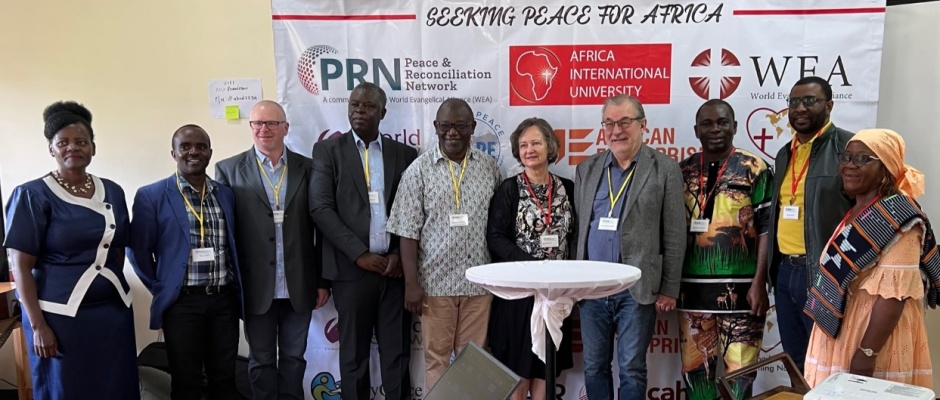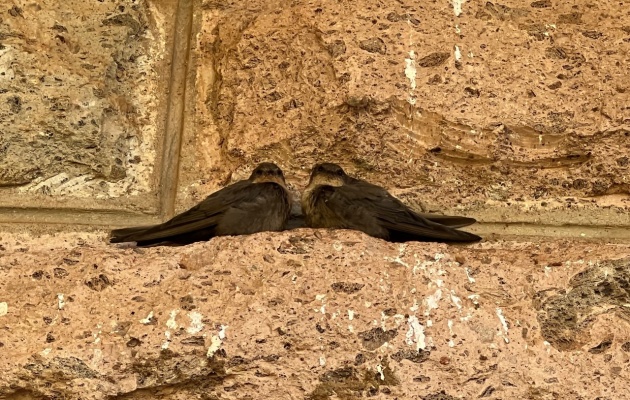The Peace and Reconciliation Network consultation in Nairobi named what has been lost and corrupted in Africa. What action is needed for a future where the Kingdom of God flourishes abundantly?

“What if every local church was a center of reconciliation?”
This is the question the World Evangelical Alliance’s (WEA) Peace & Reconciliation Network’s (PRN) Global Director, Phil Wagler, is asking as the PRN expands its collaborative approach to inspiring and equipping the church and people of peace to enable communities to live life in all its fullness.
This question was at the heart of PRN Africa’s consultation hosted January 23-27, 2023, by the Institute for the Study of African Realities under the leadership of Professor Rosemary Mbogo at African International University (AIU) in Nairobi, Kenya. Martin Kapenda, PRN Africa Network Coordinator, with a core PRN Africa team – Siseho Minyoi (Zambia), Allan Waihumbu (Kenya), Lidy Ve Kouadio (Cote d’Ivoire), and Benvictor Dibankap (Cameroon) - gathered fifty-seven church, education, NGO, ministry, and Evangelical Alliance leaders from nine different African countries to listen, pray, discuss the problems and possibilities, drink wonderful tea, and dream an African strategy for collaborative peacemaking and reconciling activity.
On day one, Dr. Master Oboletswe Matlhaope, General Secretary of the Association of Evangelicals in Africa (AEA) addressed the consultation with AEA’s inspiring hope for the continent, setting the stage for the repeated theme that the local church is crucial if peacebuilding is to happen, and has at points been part of the problem by failing to promote peace and reconciliation as a local, national, and continental body.
Central to the consultation were Jesus’s words: “The thief comes only to kill and steal and destroy. I came that they may have life and have it abundantly” (John 10:10). These are hopeful words. But, reminded Rwanda’s Dr. Joseph Nyamutera, on the way toward reconciliation and shalom, we must consider the losses that have come to us.
Hence, the consultation took time naming what has been lost, corrupted, destroyed, and stolen from Africans historically and presently in order to assess well what action is needed for a future where the Kingdom of God flourishes abundantly. How will pressing issues like church disunity, the refugee and diaspora situation, tribal violence, the impact of trauma, the prevalence of western NGO’s with their own vision, the need for and yet abuse of money, climate change, among other realities, be addressed?
“We need an African way… to rediscover an African way” to peacebuilding and reconciliation, challenged AIU’s Professor Erick Aseka. This theme of seeking a unique and contextually diverse African way for the church to be a center of reconciliation inspired much conversation. There are clues in the understanding of ubuntu (“I am because we are”), the continent’s history and indigenous ways of solving conflict, and even how the common African hut is built and contextualized that, when endowed with the way of Jesus, can restore and revitalize local communities and become a blessing to the world, where conflicts and polarizations abound.
So, what if, despite the losses and realities of this moment in time, every local church was a center of reconciliation? What if every local church was ecclesia (the Greek word Jesus used for “church” in Matthew 16:18)?

Dr. Johannes Reimer, director of WEA’s Public Engagement department, reminded participants that in the New Testament ecclesia is a banner of honour defining those called out right where they live by God’s reconciling work in Christ to take responsibility for where they live. The church is a local reality, a locally engaged communion of saints, who embody the Kingdom of God and actively bring the Kingdom of God into the lived experience of the people among whom they live. The ecclesia are active minsters of reconciliation; reconciling people to God, reconciling people with themselves, reconciling peoples with one another, and reconciling with the natural world that belongs to God the Creator. This is the “abundant life” Jesus came bringing and it is the ministry of reconciliation that God has now given the ecclesia (2 Corinthians 5:18).
This grand biblical vision, sourced in the loving purpose of God, contrasted with the laments and challenges of Africa – like poverty, political and church corruption, how men and women, boys and girls are seen, and conflicts – awakened a shared passion for a new future where the African church is an agent of social change; the vessel of God’s shalom blessing in this generation. With many young leaders present, hope for this type of future is great.
This future, declared Dr. Henry Omae, requires a renewal of the church in society: “Before we can change our politicians, we need to change us (the church).” Is the church only seeking political power? Is the church no different from the world? Political powers in African countries, reminded Benvictor Dibankap, are asking “Who is the church?” The great need, declared Cote d’Ivoire’s Lidy Ve Kouadio, is for “ecclesia being the church.”
“Church as a center of reconciliation is a vision to live for,” concluded Evangelical Association of Kenya President Dr. Nelson Makanda. With this in view Dr. Makanda, led a commissioning prayer for the PRN Africa team, blessing them to “be God’s vessels in this movement…(so) that God’s people will find shalom wherever they are.”
The following week, as a first point of action, PRN Africa hosted a Diaspora Symposium with Chris Pullenayegem, Director of WEA’s Migration and Refugee Network (MRN). The symposium brought together sixty-four participants from Burundi, Cameroon, Democratic Republic of Congo, Ivory Coast, Kenya, Liberia, Rwanda, South Sudan, Tanzania, and Uganda.
Participants shared emotional stories of pain and suffering experienced in their home countries, including the killing of family or friends. Joseph Nyamutera of Rwanda, member of the PRN International Advisory Team, focused the group on the necessary healing of emotional wounds for those who have experienced violence and displacement, and National Evangelical Alliances were urged to consider developing ministries to meet the needs of the refuges and migrants, including training in basic trauma care.
PRN Africa will now take the insights and recommendations emerging from these important gatherings to further build a strategy that includes: peace and reconciliation (training for key leaders and grassroots churches and communities, including elevating of unique African resources and education partnerships like the one formed with AIU), advocacy, mediation and international relations, and diaspora inclusion.
Joy belongs to those who plan peace (Proverbs 12:20). This hopeful reality summed up the two weeks of relationship building, prayerful listening, and planning shalom. What if every local African church planned on becoming a center of reconciliation now? Is that not a vision to live for?
Martin Kapenda (PRN Africa Network Coordinator), Phil Wagler (PRN Global Director), and the PRN Africa Team.

Las opiniones vertidas por nuestros colaboradores se realizan a nivel personal, pudiendo coincidir o no con la postura de la dirección de Protestante Digital.
Si quieres comentar o